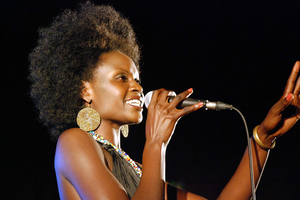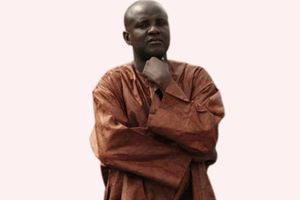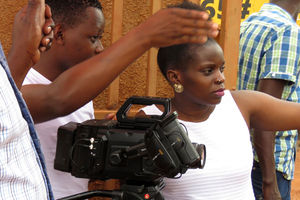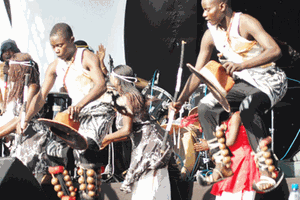
Peter Niwagaba, director of Spider during a talk back. Photo/Courtesy.
If you are a local film enthusiast, you should be aware that film-making in Uganda has come a long way. Ten to 20 years ago, most of the productions released could hardly have a steady picture in frame. We were treated to shaky images, poor sound and problematic lighting and in most cases, a script that did not actually exist.
Over the years, numerous initiatives have changed the course of an industry that seemed to wander with no sense of direction. With mentorship programmes, film projects and exposure opportunities, there has been a lot to learn, which has benefited the industry to a level that local film producers have now started exporting both onscreen and behind the scenes talent.
One of the many platforms that have enabled filmmakers to get their work seen and critiqued, has been through festivals. One of such initiatives is the annual Ngalabi Short Film Festival, a platform that brings together short format films, which are usually an entry point for filmmakers still trying to find their way in the trade.
Organised by Goethe Zentrum, Ngalabi Short Film Festival has exhibited short stories from film makers such as Daniel Kaluuya, Ali Musoke, Lorah Atwine and Loukman Ali since 2017.
This year, as they get ready for the September edition of the festival, Goethe Zentrum has teamed up with Alliance Francaise to put together the Moving Identities Film Tour aimed at moving their film work out of Kampala to other parts of the country.
According to Anna Adima, director at Goethe Zentrum, there is a growing arts and culture industry outside Kampala, which presents opportunities for talents to produce quality work.
The film tours have been taken to the districts of Mbarara, Mbale and Arua and the final leg will be in Fort Portal. In each of the cities, activations take place, groups undertake masterclasses in different aspects of film such as cinematography, writing, directing, sound and script writing.
In Arua, the technical classes conducted were of cinematography and sound recording, while there was a third class of safely, including culture into a story.
Ian Nnyanzi, who conducted the cinematography class, took participants through the different shots that are used in film production. He taught film makers to make decisions that take the plot forward.
Nnyanzi, together with novice filmmakers experimented with the long, medium and close-up shots. But it was never only about the shots as learners were tasked to come up with at least a three-minute short film and include all these shots in meaningful ways.
Nnyanzi says their work was promising, from story-telling and composition. My Fork, directed by one of the groups, was the most outstanding.
The comedic film follows one man that goes through the drill of getting food at an event, asks for a fork, but somehow, ends up not using it because culturally, he is used to using hands to eat.
Rebecca Amulen, a sound recordist of films such as Bedroom Chains, Keycard, Nambi and Victim 30, also facilitated the sound class. She told filmmakers that sound is as important to a film as cinematography and costumes.
In addition to introducing learners to quality sound equipment, she explained the best practices such as reading a script and understanding it, as a sound recordist and walking the process with the team.
Each of the master classes end with a screening of short films, some of which have been in the past Ngalabi Short Film Festivals. The tour in Arua had locals watch the animation Tula, Keycard, A Void Life and Mawe.




